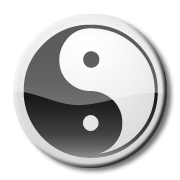Typically as a Librarian, reader and book lover, I am an introvert. So I tend towards being quiet, reserved, shy, aloof, socially awkward, not fond of big groups of people, and private. I think, ponder, listen, discern, assess, appreciate, analyse, observe and evaluate: before I speak- usually.
 I like to weigh up arguments and information. Sometimes appearing wishy-washy, non-comprehending, or a fence-sitter; I can usually appreciate both sides of a situation, and without a vested interest, nor a full understanding about all of the facts of the matter, I am reluctant to side with either polarity. Life is not black and white, but yin and yang with a little bit of each in the other.
I like to weigh up arguments and information. Sometimes appearing wishy-washy, non-comprehending, or a fence-sitter; I can usually appreciate both sides of a situation, and without a vested interest, nor a full understanding about all of the facts of the matter, I am reluctant to side with either polarity. Life is not black and white, but yin and yang with a little bit of each in the other.
I don’t like small talk, but I admire the way extroverts so easily begin with small talk and quickly move a conversation into a more meaningful depth. I can’t do this. It’s not that I am not interested in the opinions or lives of other people; I just don’t like to pry. Over the years I have learnt to manage and overcome my fears to some degree, of course.
Lately I’ve realised that the conversations I am listening to and a part of, have taken place in a variety of ways. My conversations are virtual, online, via podcasts, in person, while involved in activity, with special groups such as Buddhists, Librarians, and local government staff.
This week I attended some presentations in Second Life. The topic was “preservation of audio-visual materials”. It was strange to be sitting at home at my desk looking at my PC, whilst also being involved as an avatar seated in a virtual room with other avatars listening, observing, taking photos, and being a part of the discussions. Two robots, a pirate, a girl with wings, and other cool guys and girls congregated – alter egos for the librarian-techie-geeks, seated in our homes across the country, enjoying a topic in which we share an interest.

At work I gave a presentation in real life to a group of people about social media for our organisation. As a quiet listener, this does not come easily to me. But as they grapple with trying to control Facebook for work purposes, I tried to lead them deeper into the Web 2.0 world. They are only dipping in their toes (faces), while I was encouraging them to see the bigger picture. I tried to encourage them to create their own Personal Learning Network by providing them with a brief overview about how to do this. They looked at me with blank stares. These weren’t Librarians or people who work in libraries. Thankfully the library staff I work with are well up to speed with online tools.
Other conversations I am part of take place while cycling or enjoying the compulsory coffee afterwards. Also after sitting in meditation with a group of like-minded people, we chat about the meaning of life and how to be better at it.
I travel alone each day; a 50 minute trip to and from work; and I love to fill this time listening to podcasts. There are so many available now on a range of topics. So while I listen to someone speaking as if in conversation directly to me, I consider the absurdity of the situation. This person, who I don’t know, is sitting at their home alone speaking and recording into their PC, hoping that someone like me will find, listen to and appreciate their ramblings. I am currently listening to Dean Dwyer’s Make Shift Happen, Michael Hyatt’s This is Your Life, Steve Thomas’s Circulating Ideas, and others.
Feeling inferior and apologetic for most of my life for my bookish ways and failure to be extroverted, I am finally validated by the words of Susan Cain about the value of being quiet. I have read her book Quiet and enjoyed her TED talk. Thank you Susan.
Besides, all of these talkers, performers, teachers, and show-offs need an audience and who better than someone who is quiet, listens, observes, evaluates, and knows how to appreciate their efforts?
I am currently reading an eBook version of Make Shift Happen by Dean Dwyer, I Quit Sugar by Sarah Wilson, and The Paleo Diet by Loren Cordain Ph.D. I am also reading my study materials for the subject Social Networking for Information Professionals.




